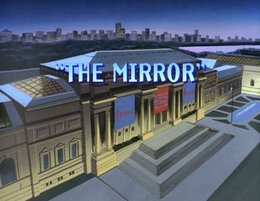Difference between revisions of "The Mirror"
m (→Continuity) |
|||
| Line 16: | Line 16: | ||
[[Brooklyn]] and [[Elisa Maza|Elisa]] both allude to ''[[A Midsummer Night's Dream]]'', the play by [[William Shakespeare|Shakespeare]] that was the source for Puck (and also Oberon and [[Titania]], who are mentioned in the dialogue but do not appear on-stage until "[[Ill Met By Moonlight]]" - unless you count Titania's alias as [[Anastasia Renard]] in "[[Walkabout]]"). | [[Brooklyn]] and [[Elisa Maza|Elisa]] both allude to ''[[A Midsummer Night's Dream]]'', the play by [[William Shakespeare|Shakespeare]] that was the source for Puck (and also Oberon and [[Titania]], who are mentioned in the dialogue but do not appear on-stage until "[[Ill Met By Moonlight]]" - unless you count Titania's alias as [[Anastasia Renard]] in "[[Walkabout]]"). | ||
| − | The first hint about Puck's alter ego as [[Owen Burnett|Owen]] (a notion that occurred to Greg Weisman and a few other members of the production team independently and simultaneously) appears when Demona says to him, "You serve the human; you can serve me." The "human" in question, of course, is [[David Xanatos|Xanatos]], though Puck immediately says "Serving humans is fun", shifting the word to plural in order to prevent the audience from becoming suspicious too early. | + | The first hint about Puck's alter ego as [[Owen Burnett|Owen]] (a notion that occurred to Greg Weisman and a few other members of the production team independently and simultaneously) appears when Demona says to him, "You serve the human; now you can serve me." The "human" in question, of course, is [[David Xanatos|Xanatos]], though Puck immediately says "Serving humans is fun", shifting the word to plural in order to prevent the audience from becoming suspicious too early. |
Demona refers to [[Hudson]] as "Old Soldier", as she did in "[[Long Way To Morning]]". | Demona refers to [[Hudson]] as "Old Soldier", as she did in "[[Long Way To Morning]]". | ||
Revision as of 15:22, 24 June 2008
"The Mirror" is the eighteenth televised episode of the series Gargoyles, and the fifth episode of Season 2. It originally aired on September 11, 1995.
- Story: Lydia C. Marano
- Story Editor: Brynne Chandler Reaves
Contents
Summary
"The Mirror" opens at the Metropolitan Museum of Art where Demona steals Titania's Mirror and uses it to summon and capture Puck. At the World Trade Center, Puck transformed all of Manhattan into gargoyles, and the Manhattan Clan into humans. By the end of this episode, Demona was given the "gift" of turning into a human by day, and reverting to her gargoyle form by night, and all of Manhattan, and the Clan were reverted to their natural forms.
Continuity
This is the first time that the Third Race, also known as Oberon's Children, is mentioned in Gargoyles. Greg Weisman is not entirely happy with the name Oberon's Children, as it has been taken too literally by many members of the audience, who interpreted it as meaning that the Third Race are the biological offspring of Oberon. (They are "Oberon's Children" in the sense that the subjects of a ruler might be seen as his children.) He considered many other names for them, all of which were rejected, including Oberati (which was discarded on the grounds that it sounded too much like the name of an Italian car).
Puck also appears for the first time.
Brooklyn and Elisa both allude to A Midsummer Night's Dream, the play by Shakespeare that was the source for Puck (and also Oberon and Titania, who are mentioned in the dialogue but do not appear on-stage until "Ill Met By Moonlight" - unless you count Titania's alias as Anastasia Renard in "Walkabout").
The first hint about Puck's alter ego as Owen (a notion that occurred to Greg Weisman and a few other members of the production team independently and simultaneously) appears when Demona says to him, "You serve the human; now you can serve me." The "human" in question, of course, is Xanatos, though Puck immediately says "Serving humans is fun", shifting the word to plural in order to prevent the audience from becoming suspicious too early.
Demona refers to Hudson as "Old Soldier", as she did in "Long Way To Morning".
At the end of the episode, Puck casts a spell on Demona so that she will become human during the day, instead of turning to stone. This spell remains in effect for the rest of the series.
Tidbits
The production team briefly considered calling Puck by his Shakespearean alias of "Robin Goodfellow" instead, out of fears that the name "Puck" might be misheard as a certain four-letter-word that rhymed with it. In the end, however, they decided to simply be very careful about how they pronounced it.
At the beginning of the episode, when Elisa in her museum guard disguise responds to the sound of Demona's break-in, her reflection in Titania's Mirror does not copy her movements. This was deliberate on the production team's part, to hint at the mirror's magical nature.
Puck's line to Demona, "What does this [Titania's Mirror] look like to you, Aladdin's lamp?" was an in-joke reference to the then-running Disney animated series Aladdin, based on the movie.
The gargoyles' human forms were modelled partly on their voice actors, with appropriate changes made for their most distinguishing characteristics that would cross over during the transformation (such as Hudson's beard).
Links
| << Previous Episode: "A Lighthouse in the Sea of Time" | Next Episode: "The Silver Falcon" >> |
